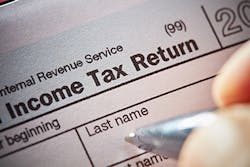We have a new administration in Washington. What can you expect and how will it affect your business?
Most things are hypothetical at this point. The Senate sits at 50/50 between the two parties with the Vice President presiding and able to cast the tie breaking vote. However, the Senate has rule, called the filibuster, where the minority can block legislation unless 3/5ths of the Senate (60%) votes for a Cloture, or 30-hour limit on debate.
The president’s tax plan can be summed up as “higher taxes.” Under his plan, corporate taxes will jump a lot. Deductions for income from pass-through entities (i.e., LLCs, partnerships, and S-corps) will go away.
Some, in the majority party want to eliminate the filibuster. However, two Democrat Senators have publicly stated they will oppose its removal. If they keep their words (something uncertain with politicians), then the Republicans will be able to block some of the legislation, or at least cause the Democrats to negotiate. This also presumes discipline among the Republicans, which has often proved ephemeral.
1. Taxes are Going Up, Up, Up
The president’s tax plan can be summed up as “higher taxes.” Under his plan, corporate taxes will jump a lot. Deductions for income from pass-through entities (i.e., LLCs, partnerships, and S-corps) will go away.
Personal income taxes will jump a little, but the cap on social security taxes is eliminated, which means overall taxes will jump significantly. Plus, deductions will be limited.
Capital gains taxes are going to be taxed as ordinary income, meaning they are practically going to double. If you inherit wealth or property, it’s basis for capital gains is set at the time of death. This goes away and represents a significant increase in taxes.
That is the plan. Who knows what will ultimately emerge from Congress?
2. Regulations Will Multiply
The last administration did heroic work reducing the Federal leviathan by cutting regulations. The current administration seems set on reversing everything the previous administration accomplished. Much of this can be accomplished through the bureaucracy and executive orders.
The president has been busy. Previous administrations approached executive orders cautiously. For example, Trump, Obama, Bush, and Clinton signed four, five, zero, and one in their first weeks, respectively. Biden signed 17 his first day and appeared to just be getting started.
3. Energy Costs Will Increase
The already ordered moratorium on drilling, the cancelation of the Keystone XL Pipeline, the return to the unratified Paris Climate Accord, the embrace of the Green New Deal, and other actions mean energy prices will increase. The United States will likely lose the energy independence we recently achieved and once again become a net oil importer.
Contractors will pay more at the pump. Consumers will pay more for electricity. This will not just be a result of supply and demand, but the potential of a carbon tax, and the push for renewables, combined with a reduction of fossil fuel power generation.
Reserve margins are already tight. Combine the increase in heavily subsidized electric vehicles, building restrictions on natural gas homes, retirement of coal plants, increase in wind and solar, and the result will be less reliable electricity.
4. All Costs Will Rise
Raise the price of petroleum and the price of virtually everything increases, from plastics to clothes to cosmetics. Transportation costs for everything else will jump.
The president wants to raise the federal minimum wage from $7.25 to $15 an hour. This will put upwards price pressure on wages across the board.
Actions You Should Take
Now, more than ever before, you should keep an eagle eye on costs. Be quick to adjust pricing when you see costs increase. You should absolutely join an organization with a buying group to offset some of the cost increases.
If electricity prices are going to spike, high efficiency will resonate. Yet, high efficiency is expensive (all HVAC is expensive relative to a few years ago). Line up financing programs where you can offer extended term notes up to ten years.
If electrical reliability suffers, consider hiring or working with an electrician to offer standby generators. Incorporate generator maintenance in your service agreement.
Consider Exiting Now
Any tax increases may be made retroactive to the start of 2021, which is tantamount to changing the rules of the game after play starts. Or, they might apply at the start of 2022. If you have been thinking about an exit, get busy. The proposed changes in capital gains makes it URGENT that you execute a transaction before the changes take effect.
Join the Service Roundtable to gain unlimited downloads of HVAC related sales, marketing, and management resources for $50 a month. Membership includes Roundtable Rewards, the industry’s largest buying group. Learn more at www.ServiceRoundtable.com.
About the Author
Matt Michel
Chief Executive Officer
Matt Michel was a co-founder and CEO of the Service Roundtable (ServiceRoundtable.com). The Service Roundtable is an organization founded to help contractors improve their sales, marketing, operations, and profitability. The Service Nation Alliance is a part of this overall organization. Matt was inducted into the Contracting Business HVAC Hall of Fame in 2015. He is now an author and rancher.
